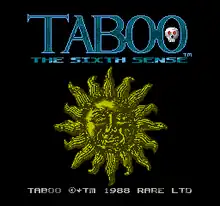| Taboo: The Sixth Sense | |
|---|---|
 Title screen | |
| Developer(s) | Rare |
| Publisher(s) | Tradewest |
| Designer(s) | Julian Jameson |
| Composer(s) | David Wise |
| Platform(s) | Nintendo Entertainment System |
| Release | |
| Genre(s) | Non-game |
| Mode(s) | Single-player |
Taboo: The Sixth Sense is a tarot card reading simulation developed by Rare and published by Tradewest for the Nintendo Entertainment System (NES) in 1989.
This video game gives users a tarot reading where the "dealer" automatically shuffles the cards. It is the only NES game to carry two warnings: that it is intended for players ages fourteen and older and the game is intended for entertainment purposes only. Taboo was marketed as a party game that multiple adults could enjoy simultaneously.[2]
Gameplay
Upon loading, the game requires input of the player's name, birth date, and gender.[2] The game then asks the user to input a question, and shuffles the cards.[2] The game then generates a tarot reading via the Celtic cross layout. These cards can be normal or reversed. Afterward, the player chooses a state from the United States and is given lottery numbers accordingly. The game uses the whole 78-card tarot deck, which consists of the Minor Arcana and Major Arcana.
The instruction booklet gives a brief history of the origins of the word "Tarot".[2] The booklet also lists the arcana and cards, and goes into further detail of the layout, including what each position on the Celtic cross means. There is no actual game activity to be found apart from repeated readings. The game contains nudity and religious images, which were usually unacceptable under Nintendo of America's content guidelines.
Urban legend
An urban legend surrounding Taboo states that the game had accurately predicted the deaths of some of its young players.[3]
See also
- House of Tarot 1991 Sega video game
- Tarot Mystery 1995 Super Famicom video game
References
- ↑ "Release information". GameFAQs. Retrieved 2008-07-25.
- 1 2 3 4 "Basic game overview". allgame. Retrieved 2011-12-27.
- ↑ "7 Cursed Video Games That Made Players Go Insane". culturacolectiva.com. 2017-05-24. Retrieved 2020-02-05.
External links
- Taboo: The Sixth Sense at MobyGames
- Putting Taboo To The Test - Will The Writer Win The Lottery With Taboo's Suggested Numbers?